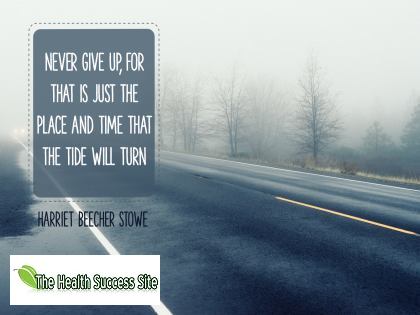| Back to Back Issues Page |
 |
|
Diet Reward and Penalty" - Your Health Success ezine January 01, 2019 |
I hope you enjoy the e-zine as much as I do writing it. Index: Optimum Health Tip: Quote of the Day: Health Report: Diet Reward and Penalty System Recommendations & Sponsors Warren’s Notes Have a Laff! Inspirational Meme: Your ebook download "How to Live to 100" Thank you to my readers who refer other people to my ezine. If they want to subscribe for the next edition, they can just visit the website and subscribe here: SUBSCRIBE to eZine If you ever decide that you want to unsubscribe, you will find the link to do so at the bottom of this page. (But we will really miss you!) Optimum Health Tip:Bad Habits1. While there may be some health benefits to wine and very moderate drinking, excess is never good for you, so keep things in check. 2. We all know smoking is bad for you, but did you know that it can decrease fertility in both men and women? 3. Put your best foot forward for quitting smoking. Know WHY you want to quit and let that knowledge carry you through. 4. The average weight gain when quitting smoking is 6-8 pounds. Don’t let this worry you because the benefits of quitting will make you far more attractive to others. 5. Avoid weight gain and find a healthy distraction when quitting smoking, by getting active. Find a sport, run with your dog or play outside with the kids. 6. While skipping breakfast may seem like a good idea to reduce calories, it actually slows down your metabolism and can contribute to weight gain. 7. Did you know that slouching can cause headaches? Sit up straight…it’s good for you.
Motivating Quotes:"Look up, laugh loud, talk big, keep the color in your cheek and the fire in your eye, adorn your person, maintain your health, your beauty and your animal spirits." William Hazlitt “It's so important to realize that every time you get upset, it drains your emotional energy. Losing your cool makes you tired. Getting angry a lot messes with your health." "My luck is so bad that if I bought a cemetery, people would stop dying."
REPORT: "Diet Reward and Penalty System"
One medical study showed that more than 40 million people go on a diet every year and billions of dollars are spent annually in the effort to lose weight. But despite those efforts, well over half of the people on a diet will fail. That failure is caused by not recognizing and implementing the diet reward and penalty system. Knowing that there are penalties in place works to change the behavior of a dieter, which in turn motivates people. You can put a diet reward and penalty system in place in your own life and find the weight loss success that may have eluded you. Setting Goals and Action Steps You have to start by setting goals. This is the biggest area that throws most dieters off track. They either don’t set concrete goals or they start out with goals that aren’t realistic. If you want to have weight loss success, you can’t get off on the right foot by unknowingly
sabotaging yourself. The psychology of dieting in the brain makes people focus on the complete goal, such as wanting to lose fifty pounds. Instead of breaking down that fifty pound weight loss into steps that are easily achievable, what most people who fail to reach diet goals do is they don’t break the goal down far enough. Having an overall goal is important - but not nearly as important as the steps you have to take to reach each small one. Weight loss goals should have an end target. That would be losing the fifty pounds. Next, you need an action plan and this is what derails the majority of dieters. Their action plan isn’t realistic enough. They might write down a goal as being that they want to lose that fifty pounds in a month. Not only is that a recipe for failure, but trying to achieve that loss that fast could lead to health problems. It can also lead
to disappointment and feelings of depression when you don’t make that goal. Your action plan should include simple, achievable steps known as short term goals that all point toward your long term goal - losing the fifty pounds.
Your action steps should include things you can do that point toward weight loss. You might do things like cutting back on the amount of calories you eat or limiting your carbs. You might create an action plan that includes eliminating foods that are your trigger foods and replacing them with ones that help you stay on track. You should include room in your action plan for splurges. This helps keep the brain motivated because it’s part of the reward system. This treat doesn’t have to be food related - and in fact, shouldn’t be because
it feeds into the cycle of using food as a reward, which is what can lead to self-sabotage and weight gain. Track your goal accomplishments. Keep records of what you eat, the amount of calories or carbs and keep a weekly total of the pounds or inches lost. Also make sure that you note how active you are. The reason you want to keep track of what you do that feeds into your goals is because during the times when you feel less motivated, looking back at what you accomplished can help motivate you again. So start your weight loss journey with three things in mind - your overall goal, your action steps or smaller, short term goals and the effort of tracking your successes. Diet Rewards One of the biggest mistakes that you can make when dieting is rewarding weight loss by allowing yourself to have a food treat - especially one that’s not all that good for you. The reason that it’s a mistake is because it encourages eating to feed emotions such as feeling happy that you lost some weight or stuck with an exercise program for a few weeks. Creating an emotional connection to food as a reward system is something that will foster a return to unhealthy eating habits. The rewards that you choose should be a scale of items or events. You can create a point system based on what you accomplish. For example, if you eat healthy an entire day, give yourself a point. If you eat healthy for an entire week, that would be seven points. Save up your points to get something for yourself or do something that you really want. This type of delayed diet reward helps keep you motivated so that you continue forward. When you reach a certain point level, say twenty-five points, then you can cash them in for your reward. Use diet rewards to do things like purchase a book
you’ve really been wanting to read. Or spend the points on music or a trip to the movies. You can buy yourself a pair of new earrings or a watch. You can buy tickets to a sports game or invest your points by purchasing a new gadget for your home or vehicle. You can take a fishing trip or go on a hike. Go to the museum or visit a place you’ve always wanted to see. Saving up your points to take a trip out of town or for a cruise is a great way to motivate you to keep on track. You can buy yourself new shoes or an item of clothing you want. If you hold on to the points until you reach certain milestones, then you can use your points to buy a complete outfit. You can treat yourself to a live music concert or a night out dancing with friends. You can take a vacation day. Spend the points by paying for a class that you’ve always
wanted to take or spend the points by buying tools for a new hobby. You can bank points until you have enough saved to buy something nice for your home. When you use a healthy reward system, that encourages healthy habits. The power of a reward is a great way to release dopamine which makes you feel good. And when you associate feeling good with rewarding yourself and losing weight, you’ll be sure to hit your goal.
Recommendations & Sponsors:Our Sponsors and Affiliates are what keep this newsletter and our website self help books, articles and resources free to you, so we appreciate your support when purchasing from our sponsors.I have been involved in sports all my life, and in my 50's I started serious weight lifting. My goal is to enter competitions after my 60th birthday and challenge the Australian categories in my age group. As a result I have learned much about this sport and the requirements for building muscle. This book with give you valuable tips to begin your own body building and weight lifting career:
REPORT: "Diet Reward and Penalty System" continued:Why You Should Use a Penalty System When DietingStudies have shown that most dieters like getting something as a reward for losing weight but more than that, they hate the idea of losing something they want or something they have if they don’t stay the course. Negative consequences can actually do more to cause changes in behavior than positive consequences can. No one likes to be penalized and people will work harder to keep that from happening than they will if there was no punishment in place. The science of the reward and penalty system works to effectively lead to weight loss and changing bad habits as well. What some people do is they set a goal to lose weight and have short term goals in place. When they reach that short term goal, they then reward themselves by paying a certain amount of money into
their diet fund. For example, you can give yourself a dollar, five dollars or whatever for each pound you lose. That money then goes toward something you want to buy. But if you fail to lose or you gain, then you must pay that money to something or to someone else. This punishment system is effective because no one enjoys giving his or her money away. You can find some apps for use with a smartphone that are based on a monetary reward or penalty system to help keep you moving toward your weight loss goals. The punishment that you choose should be one that really matters to you. If you couldn’t care less if you have to pay out some money, then that punishment isn’t substantial enough. So instead of that, you could set your penalty to be having to give up something you really enjoy doing such as watching the newest episode of your favorite show.
Your penalty system should never be based entirely on punishment. For it to be effective, you have to make sure you have something positive built in to the punishment. An example of that would be making sure whatever exercise you choose to do is one that you really like versus one that you don’t. Having exercises that you enjoy makes it easier to stick with it. So if you don’t exercise, then your punishment could be losing the night out with friends that you were looking forward to. Or having to skip the movie you were planning to go see. Never use food to penalize yourself for failing to stick with your goal. If you do that, you can start to associate negative feelings and feedback to dieting or exercising. Whatever penalty you use should never be associated with shame. All that does is fill your head with negative self talk and you don’t need that. Getting Back on Track You’re doing so well on your diet and you have several smaller goals already under your belt. You’re feeling on top of the world like nothing can stop you from losing the weight you want to shed when it happens. There was a birthday celebration at work and the treats just looked and smelled too good to give up. So you indulged more than you should have. Or you went out to eat and decided you wanted to have that thick slice of pizza loaded with fat, calories and dripping with cheese just like everyone else was eating. First, you need to realize that every single
person in the world who has ever dieted will at some point get off track. It doesn’t make you a failure or a loser. What it makes you is human. However, you don’t want to stay off track long because if you do that, it’s harder to head back in the right direction toward weight loss. What most people do when they get off track is they end up filled with regret and sometimes self-loathing. They tell themselves they can’t believe they blew it. From this point, it can go one of two ways. One way is when people feel so disgusted that they blew it that they allow feelings of discouragement to take hold. Then they think of how they’ve worked so hard and it’s all for nothing. They subconsciously decide that they might as well blow it big since they blew it at all. So they blow off eating right for a few more meals - maybe even a week or two. They skip the gym and before you know it, all of those unhealthy habits
show right back up. Then they get into the mindset of berating themselves, internalizing negative self-talk and calling themselves all kinds of names. At this point, you need to learn to stop beating yourself up. You didn’t do something that can’t be undone. It might take you a little longer to reach your goals, but it doesn’t mean that it’s too late. The second way that it can go if you get off track is to refuse to play the shame game. So you didn’t stick with it like you’d hoped. It’s not the end of the world. Realize that you made a mistake and then make a fresh commitment to begin again. That’s the key to getting back on track every time you get off track. Realize it was a mistake and begin again. This allows you to give yourself a fresh start. The Key to Success Using a Diet and Penalty System With any diet plan, you have to realize that one that’s so
rigid there’s no room for any bending at all is one that is bound to fail. No diet should be so set in stone that it doesn’t allow room for you to make changes to improve the diet and the penalty system. You might find that portions of your diet plan that work for some people just don’t work for you. By forcing yourself to keep plodding along, you can bet that you’re going to give up at some point. Your diet system has to work for you. It has to work for your lifestyle, for your personality and for your budget. If it doesn’t work for all three of those, then you have a weak link in your diet and at some point, it will fall apart. You need to be able to adjust whatever diet plan you’re using as you go along. People get too rigid and you don’t need to do that. It doesn’t matter if you have to make tweaks to your diet plan to get it to work for you. If it works for you,
then that’s all that you need. But if it doesn’t, then you have to find something that does. And it’s the same thing with your exercise. If you’re doing something that you hate to the point you’d rather have a root canal, then the odds of you reaching your weight loss goals are pretty slim. Exercise doesn’t have to be the bane of your existence if you make it something that you really like doing. It’s the same way with the penalty system. You can’t be too rigid. Because as time goes on, you might get a little bit apathetic toward weight loss. When your penalty system is too harsh, then it will be easier to quit. You should adjust your penalty system as you go along. In the beginning of deciding a penalty, most people are actually too harsh on themselves. You want it to be something that matters to you, but not something that you’d rather quit dieting than face the loss of whatever you
picked. When you use a diet reward and penalty system together, it can work for successful weight loss where many other plans have failed you in the past. Many people focus only on rewards or penalties. Some people don’t feel any penalty should be delivered to someone who is dieting. But for others, it will help motivate them to reach their goals. Only you will know what’s right for you, and feel free to tweak the system to where it most benefits your personality and style.
Just enter WT (in capitals)to open the page.

News!
For all the subscribers that don't want to talk to anyone, just want to buy their products direct, I'm creating these websites that process orders for you once you register with them. |
| Back to Back Issues Page |





 Hi,
Hi, 


